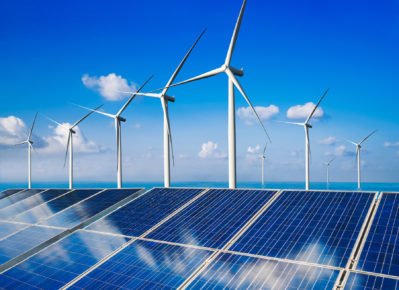
Sample report

Constellation customers receive a customized report showing greenhouse gas emissions based on actual usage and the products that Constellation is providing to the customer, alongside the potential impact of energy efficiency projects and emissions mitigation. The report provides the information you need to start your journey to meet your sustainability and carbon reduction goals.
Types of emissions
To start the process, it’s important to get acquainted with the various sources of emissions associated with businesses. Greenhouse gas emissions are classified as either Scope 1, 2 or 3 emissions based on their source.
Emissions associated with on-site natural gas use (generation, heat, etc.) and fleet consumption of fossil fuels.
Emissions from generation providing purchased electricity.
Emissions from indirect sources, such as employee business travel and supply chain management.
To reduce SCOPE 1 emissions,
such as natural gas burned in a boiler or gasoline/diesel/fuel oil used in vehicles or equipment, you can:
- Implement energy efficiency projects
- Incorporate electric vehicles
(EVs) into your fleet - Purchase renewable natural
gas (biogas) - Procure carbon offsets
To reduce SCOPE 2 emissions,
you can voluntarily match your electricity supply requirements with Emission-Free Energy Certificates (EFECs) or Renewable Energy Certificates (RECs) to support the use of emission-free fuels.
Take the next step toward reaching true zero emissions by using Constellation’s electricity supply that is sourced 100% from carbon-free power, or go even further with our in-development 24/7 real-time carbon-free energy matching.
To reduce SCOPE 3 emissions,
you can choose more sustainable vendors (or encourage existing ones to engage in more sustainable practices) that assist with the following:
- Purchased goods and services
- Business travel
- Employee commuting
- Waste disposal
- Use of sold products
- Transportation and distribution (up and down stream)
- Investments
- Leased assets and franchises
In addition to the above, any Scope 1, 2 or 3 emissions can be indirectly reduced through the purchase of carbon offsets.
Our energy professionals can help you build a custom roadmap to meet your sustainability and carbon reduction goals at each step of your journey.
Understand your facility usage and utility bills
Analytics platforms such as Pear.ai can help you manage carbon emissions data associated with your utilities, including energy, water, sewer, and diesel. Use it to generate valuable insights, such as baseline energy usage data and how energy efficiency upgrades and other options can reduce emissions.
Make energy efficiency upgrades
Energy efficiency upgrades, such as LED lighting and HVAC upgrades, can help reduce energy consumption and carbon emissions. With Constellation’s Efficiency Made Easy® (EME) program, you can implement those infrastructure improvements with no upfront capital.
Purchase EFECS and RECS
Emission-Free Energy Certificates (EFECs) represent the emission-free attributes
of generating sources that do not emit greenhouse gases, such as solar, wind, nuclear and hydropower. At today’s prices, these are the most cost-effective certificates available. Renewable Energy Certificates (RECs) represent the emission-free attributes of one megawatt hour (MWh) of electricity generated only by renewable power plants, such as from wind or solar power.
Explore renewable natural gas
Directly reduce greenhouse gas emissions resulting from natural gas consumption by matching your gas purchases with environmental attributes of renewable natural gas (RNG), derived from sources including landfills, wastewater treatment plants and commercial & agricultural waste digesters.
Leverage carbon offsets
Indirectly reduce such emissions through the purchase of carbon offsets, which represent a verified reduction in emissions of carbon dioxide or other greenhouse
gas emissions made elsewhere through forestry, energy efficiency, industrial process improvements and carbon
capture & sequestration projects.
Procure offsite renewables
Through Constellation Offsite Renewables solutions, you have the ability to go beyond purchasing certificates and integrate energy from specific renewable energy projects in your region. Purchase renewable energy from existing (CORe) or new-build (CORe+) generation, including solar and wind facilities, into load-following energy supply.
Pursue 24/7 matching of clean electricity with your load
By matching your electricity use with a local emission-free energy source in real time, you can go beyond other net-zero programs to allow you to eliminate the carbon impact of your operations and fully achieve zero emissions goals.
Support a cleaner, healthier environment for your business and community.
Reduce energy usage
Your business can become more efficient if you spend less on fossil-based energy and therefore cause fewer emissions.
Meet environmental, social & governance (ESG) principles
Consumers and investors increasingly expect corporations to reduce emissions as a demonstration of their commitment to being a good corporate citizen.
Improve public health
Your sustainability goals can directly and positively impact the environment by improving air quality and reducing emissions.

Constellation is the nation's largest carbon-free energy producer and a leading supplier of clean energy solutions.
Achieve your sustainability targets
With our broad array of innovative clean energy solutions, Constellation can help you achieve your carbon reduction goals at each step of your journey. Work with our energy professionals to develop the right solutions for your business. Put your strategy into action. Transform your business to confront the climate crisis.
Watch: Sustainability 101, a Constellation Video Series

1Sustainability 101: Renewable Energy, Greenhouse Gas & Carbon Reduction

2Sustainability 101: Emissions & Credits

3Sustainability 101: Building a Sustainability Plan









